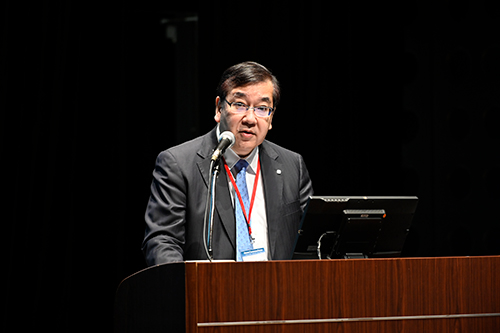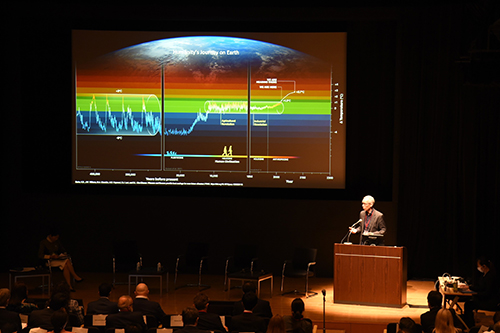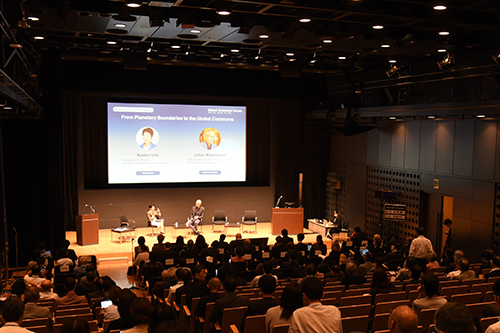On October 8, RIKEN, together with the University of Tokyo and Center for Global Commons (CGC) at the University of Tokyo, hosted the Global Commons Forum at the Marunouchi Building Hall in Tokyo. The event was attended by approximately 700 people both at the venue and online.
RIKEN is currently preparing to launch an international collaboration to tackle the challenge of maintaining and restoring the global commons. The global commons constitutes the common assets of humankind, including the global environment, ecosystems, and its natural resources. The CGC is leading a project called "Global Commons Stewardship" to create an international framework and viable strategies for the conservation of these global systems. RIKEN has already begun collaborating with the CGC , and as part of this collaboration, co-hosted this forum, which brought together leaders from academia and industry from Japan and abroad to discuss strategies for a better future.
In his opening remarks, President Makoto Gonokami said, "Humanity has developed its civilization supported by a stable global environment, but as a result of our pursuit of affluence, the balance of the global environment is about to be greatly disrupted. Scientists around the world living today must create ‘new wisdom’ with a sense of crisis and responsibility, and take action to solve global-scale problems and transform society."
 Opening Remarks by President Gonokami
Opening Remarks by President Gonokami
Johan Rockström, Director of the Potsdam Institute for Climate Impact Research (PIK) in Germany, who proposed the concept of "Planetary Boundaries" (the limits of the Earth), then gave a keynote speech entitled “From Planetary Boundaries to the Global Commons.” He reported that a health check of the planet has revealed that the Earth's resilience is approaching an irreversible "tipping point." He explained using research data that a paradigm shift with scale and speed is needed to protect the global commons, involving economic systems as well as international cooperation, and that the state of the Earth 100 to 1,000 years from now will depend on the efforts made over the next 5 to 10 years. He emphasized the urgent need to establish legal system for safety with fairness to alleviate stress and aid in recovery.
 Keynote speech by PIK Director Johan Rockstrom
Keynote speech by PIK Director Johan Rockstrom
 Dialogue between Nahoko Ishii, Special Envoy for Global Commons and Director of the GCC, and PIK Director Johan Rockstrom
Dialogue between Nahoko Ishii, Special Envoy for Global Commons and Director of the GCC, and PIK Director Johan Rockstrom
The keynote address was followed by four panel discussions on Governing Global Commons, Nature Positive Economy and Finance, Pathway to Carbon Neutrality, and System Transformation and Resilience, a number of leaders of academia and industry from both Japan and overseas, including Peter Bakker, CEO of the World Business Council for Sustainable Development (WBCSD), discussed efforts to protect the global commons, and how the current economic system and capitalism can be transformed into a "nature-positive" one.
For the closing remarks, Teruo Fujii, President of the University of Tokyo, took the stage with two students from the university, who represented the younger generation who will be responsible for the future of humanity, and discussed their interests and dreams.
Following the forum, RIKEN, PIK, and the CGC held a tripartite meeting attended from RIKEN’s side by researchers from the RIKEN Center for Sustainable Resource Science, Bioresource Research Center, and Center for Computational Science. At the meeting, the RIKEN researchers proposed that in order to devise a rapid and feasible strategy for maintaining the global commons, RIKEN could provide knowledge based on the world’s highest level of fundamental research, leveraging its strengths in the creation of multilevel scientific data from the molecular level to the Earth system using its state-of-the-art research infrastructure, high-quality and abundant bio-resources, and the advanced computational power of its supercomputer Fugaku.
